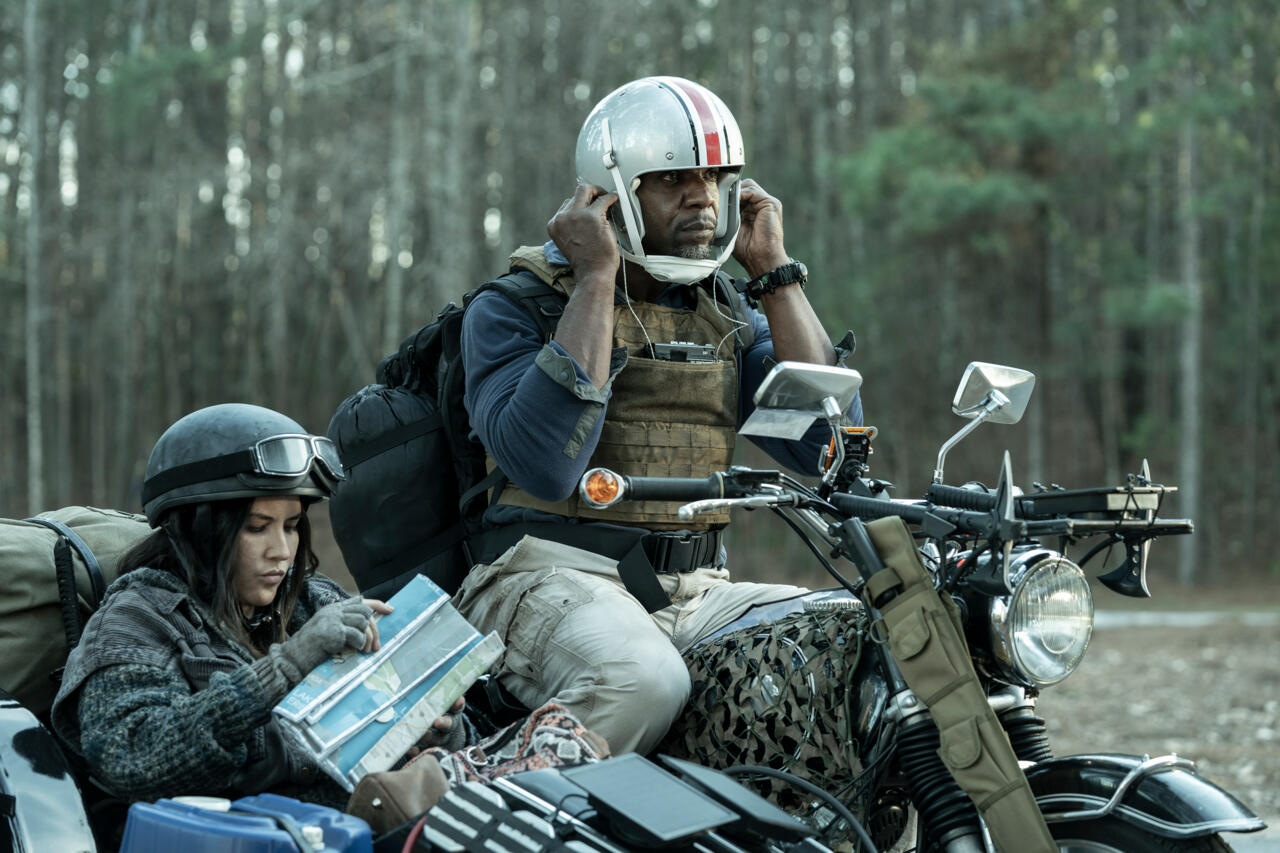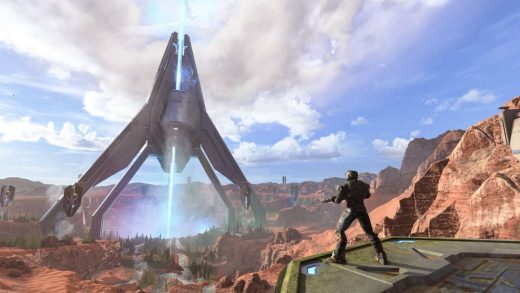
The thing about zombies is they’re evergreen. Better than that, they’re adaptable. You can put the undead in pretty much any time period, story setting, or genre and they’ll have the potential to thrive as an added narrative layer. Zombie western? Sure why not. Zombies in medieval Korea? That works. Zombie love story? Yeah, go for it. Naturally, that means Tales of The Walking Dead, a zombie anthology series spinning off from the AMC’s long-running tentpole drama, is at the very least a good idea on paper. After watching three of the series’ first four episodes of its forthcoming debut season it’s a decent idea in practice too, though it already shows signs of wildly varying quality from story to story.
The first episode that debuts August 14, “Evie/Joe,” is by far the worst of the trio AMC provided for review–episode three, which looks to be Alpha’s origin story and features Samantha Morton’s return to the franchise, was not available in time for review. Starring Terry Crews as an ex-running back turned doomsday prepper and Olivia Munn as an earthy New Ager, the odd couple plot of the premiere is a mess. It seems designed to shock the system of any longtime Walking Dead fan with a tonal departure so fierce that it may give viewers whiplash. On one hand, it’s admirable–perhaps even necessary–to start so far away from what TWD fans are used to. It tells viewers, “Look, this is going to be different.” But while it may get an A for that concept, the debut episode gets an F for execution.
It’s joke-y, but never sincerely funny. Taking place one year after the fall of civilization, the characters feel like they exist in a totally different story universe. Both Munn and Crews feel unfit for what the episode requires of them, and sadly have no chemistry together. It might be a tightrope-walk to successfully tell a comedy story in this usually grim and gloomy world, but that just means the writers need to be careful. Here, they aren’t, and as a result, the first episode is tough to finish.

Its third act is worst of all, with a villain reveal that arises for no earned reason. It’s all written so loosely and lightly that stakes never present themselves. That leaves the episode needing to fall back on its comedic chops, which is the safety net below the tightrope that the episode misses entirely, leaving the premiere to splat on the surface like a walker mindlessly stepping off a skyscraper.
Thankfully, the second episode, “Blair/Gina,” is much better. In fact, it’s the best of the bunch. It takes the same concept as the first episode–succinctly put as “let’s get weird”–but executes in every way the prior episode does not. Starring Parker Posey and Jillian Bell, the episode trades odd couple hijinx for the high concept du jour: a time loop story. That’s not something anyone would expect to see in The Walking Dead universe, but because the performances are excellent and the script lands its jokes in this second attempt, it winds up being a fantastic standalone episode even if you’ve never seen another single second of The Walking Dead.
Posey and Bell shine as an overbearing boss and her fed-up receptionist, respectively, who are grappling with daily life at a small Atlanta insurance company in the earliest days of the zombie pandemic, before people really know what’s going on. With shades of both Office Space and Ling Ma’s Severance (not that Severance), the looping plot collapses in on itself in impressive ways considering the surge of recent Groundhog Day-likes. Posey is fantastic, and, unlike Crews in the first episode, her enjoyment of the role jumps off the screen. Bell is perhaps a little underutilized given that she’s a known commodity when it comes to playing a hilarious office worker, but as a whole, the episode really works in ways that give hope to the series going forward.
It’s out-there, and just when you might think, “How is this happening in the same world as Rick Grimes and Negan?” the episode leaves space for an out. The artistic license the writers utilize in this episode is the promise of a TWD anthology fulfilled. I’m not opposed to the series being all over the place–that should be its strength, really. I only hope that the real oddball episodes are more often as well-written as this one as opposed to the forgettable mess that is its predecessor.
In the final episode made available for review, “Amy/Dr. Everett” rejects the humorous tones of the first two and sticks closer to a level of seriousness the series has been known for to date, though still not without an interesting new wrinkle. Dr. Everett is a documentarian and scientist who is studying the undead, or, as he calls them, Homo Mortis, in a valley where pockets of walkers have been cut off from what’s left of society, thereby allowing him to study them in solitude. The episode even begins with an excerpt of his nature documentary, in which his narration teaches us about the zombies as though they’re a herd of African bush elephants. When he stumbles upon a survivor named Amy, who got separated from her group, the episode turns into virtually one long philosophical debate about nature and human intervention.
Like other times The Walking Dead has sought to overtly make philosophical claims, like the seasons upon seasons of Morgan arguing retributive versus restorative justice, this episode isn’t some remarkable thinkpiece on the blight of humanity on the natural world, nor is it an immensely thoughtful character study on loneliness and group belonging. It touches on both of those things, but ultimately fits best as a springboard for interested viewers to seek more complex material elsewhere–and I think that’s fine.

As the third spinoff of a decade-old horror series, I’ll take some neurons firing in between gross zombie kills when I can get them. I don’t think Tales of The Walking Dead needs to, or even wants to, up the thematic ante for the series, but if it can touch on some thought-provoking material in between comedic departures and absurd time loops some of the time, these one-off episodes can be a long-lasting success.
Individually, the three episodes seen so far are all over the map in terms of quality, ranging from must-see to totally missable. My suspicion is the series will live on with a similar inconsistency, where episode quality rises and falls depending upon each new cast and script. If the series commits to tackling an array of genres in episodes to come, my hope is that a diverse and rotating collection of voices can contribute, to better provide for the specific needs of each genre.
An anthology can be liberating for a world like The Walking Dead, untying creatives from characters with the historical baggage of Daryl, Gabriel, and Maggie. But a tabula rasa is only as interesting as the designs ultimately left on it. My expectation is we haven’t seen the last of Tales of The Walking Dead’s great or terrible episodes, and it’s going to be a minefield for weekly viewers to determine which one they’ve got in front of them on any given Sunday.


